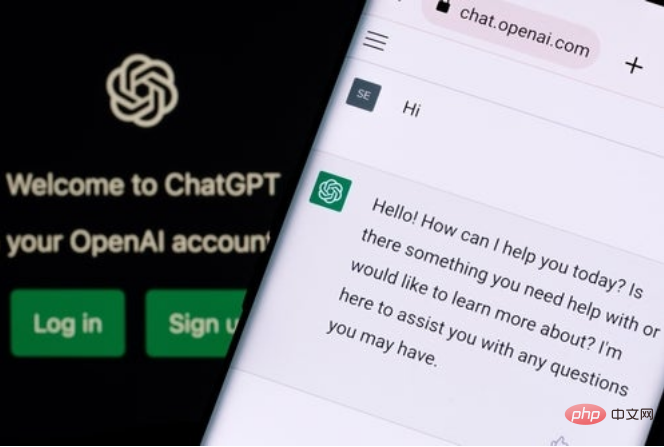 Technology peripherals
Technology peripherals
 AI
AI
 Pay attention to corporate security: Samsung prohibits employees from using ChatGPT generative AI and reminds companies to pay attention to security issues.
Pay attention to corporate security: Samsung prohibits employees from using ChatGPT generative AI and reminds companies to pay attention to security issues.
Pay attention to corporate security: Samsung prohibits employees from using ChatGPT generative AI and reminds companies to pay attention to security issues.

The latest survey report shows that more than 70% of companies are still in the "exploration" stage when it comes to deploying generative AI. This means that AI developers developing large language models need to ensure that their products have appropriate data security mechanisms in order to keep enterprise users happy.
Recently, large companies such as Samsung have begun to ban employees from using AI tools such as ChatGPT due to concerns about data security. One analyst said vendors like Microsoft will need to design and deliver solutions tailored to businesses if they want the technology to succeed.

Samsung bans employees from using ChatGPT, generative AI risks data leakage
As the source code was leaked last month, Samsung The company’s employees have been ordered to avoid using AI tools such as chat GPT, Bing and Google’s Bard. Previously, other technology companies have issued similar statements expressing concerns about data security using generative AI.
OpenAI recently confirmed that it is developing a specific version of the ChatGPT platform for enterprise users. The platform by default prohibits enterprise users from using conversations in ChatGPT retraining. It's unclear whether this will be enough to address the security concerns of large enterprise customers, but executives at these companies are clearly eager to adopt the technology.
According to a Gartner survey of 2,500 industry executives, 45% of respondents believe that ChatGPT has promoted AI investment, and 70% of respondents said that their organizations are researching ways to deploy generative AI. approach, 19% of respondents are already in the pilot or production stage.
Gartner Vice President Analyst Frances Karamouzis said: “Users’ obsession with adopting generative AI shows no signs of abating. Many industry organizations are scrambling to decide how much money to invest in generative AI solutions and which products. Is it worth investing in, when to start and how to reduce the risks posed by this emerging technology."
Most tellingly, 68% of respondents believe the benefits of generative AI outweigh the risks, with only 5% of respondents believe the risks of using this technology outweigh the benefits.
As investments in generative AI deepen and the implications for data security become more apparent, these situations may change, as is the case with the security dilemma faced by Samsung (the company is building its own AI Model).
The general trend is that avoiding generative AI may be harder than deploying it
Despite the global economic slowdown and mass layoffs in the technology industry, only 17% of respondents Reporters stated that cost optimization is the main reason for investing in AI, while customer experience is the most important focus.
With companies like Microsoft deploying AI in its CRM and Office 365 suites through Copilot, and Salesforce adding chatbot technology to its full suite of products, avoiding the adoption of generative AI may be harder than deploying it.
Avivah Litan, vice president and analyst at Gartner, said that enterprises face multiple risks when using public large-scale language models, but there are ways to mitigate the risks, including ensuring that they have the ability to automatically filter the output of misinformation, hallucinations and Unnecessary factual information.
She said enterprises also need to ensure that large language model vendors provide verifiable data governance and security guarantees to ensure that corporate confidential information transmitted to large language models is not compromised. There is also a need for transparency to ensure that any use complies with legislation such as GDPR regulations and the EU AI Act.
She explained: “Until these requirements are met, we are seeing cautious businesses either restrict employee access to chat (which is impossible to enforce due to the presence of personal devices), or Allows for measured experimental use, thereby avoiding sending confidential data to large language models.” Benefit from public models trained on sets. Litan said, "The huge value of the large language models developed by OpenAI and third parties lies in the large amounts of data to train them, and the huge and complex supercomputer power required to run them. Enterprises simply do not have the resources to rebuild these valuable models."
The solution for OpenAI, Microsoft, and any vendors that want to deploy this technology is to create technology tools through a shared security responsibility agreement. Vendors should be held accountable if confidential data is leaked, and that's the way forward.
The above is the detailed content of Pay attention to corporate security: Samsung prohibits employees from using ChatGPT generative AI and reminds companies to pay attention to security issues.. For more information, please follow other related articles on the PHP Chinese website!

Hot AI Tools

Undresser.AI Undress
AI-powered app for creating realistic nude photos

AI Clothes Remover
Online AI tool for removing clothes from photos.

Undress AI Tool
Undress images for free

Clothoff.io
AI clothes remover

Video Face Swap
Swap faces in any video effortlessly with our completely free AI face swap tool!

Hot Article

Hot Tools

Notepad++7.3.1
Easy-to-use and free code editor

SublimeText3 Chinese version
Chinese version, very easy to use

Zend Studio 13.0.1
Powerful PHP integrated development environment

Dreamweaver CS6
Visual web development tools

SublimeText3 Mac version
God-level code editing software (SublimeText3)

Hot Topics
 1387
1387
 52
52
 How to get logged in user information in WordPress for personalized results
Apr 19, 2025 pm 11:57 PM
How to get logged in user information in WordPress for personalized results
Apr 19, 2025 pm 11:57 PM
Recently, we showed you how to create a personalized experience for users by allowing users to save their favorite posts in a personalized library. You can take personalized results to another level by using their names in some places (i.e., welcome screens). Fortunately, WordPress makes it very easy to get information about logged in users. In this article, we will show you how to retrieve information related to the currently logged in user. We will use the get_currentuserinfo(); function. This can be used anywhere in the theme (header, footer, sidebar, page template, etc.). In order for it to work, the user must be logged in. So we need to use
 How to elegantly obtain entity class variable names to build database query conditions?
Apr 19, 2025 pm 11:42 PM
How to elegantly obtain entity class variable names to build database query conditions?
Apr 19, 2025 pm 11:42 PM
When using MyBatis-Plus or other ORM frameworks for database operations, it is often necessary to construct query conditions based on the attribute name of the entity class. If you manually every time...
 Java BigDecimal operation: How to accurately control the accuracy of calculation results?
Apr 19, 2025 pm 11:39 PM
Java BigDecimal operation: How to accurately control the accuracy of calculation results?
Apr 19, 2025 pm 11:39 PM
Java...
 How to process and display percentage numbers in Java?
Apr 19, 2025 pm 10:48 PM
How to process and display percentage numbers in Java?
Apr 19, 2025 pm 10:48 PM
Display and processing of percentage numbers in Java In Java programming, the need to process and display percentage numbers is very common, for example, when processing Excel tables...
 How to package in IntelliJ IDEA for specific Git versions to avoid including unfinished code?
Apr 19, 2025 pm 08:18 PM
How to package in IntelliJ IDEA for specific Git versions to avoid including unfinished code?
Apr 19, 2025 pm 08:18 PM
In IntelliJ...
 How to efficiently query large amounts of personnel data through natural language processing?
Apr 19, 2025 pm 09:45 PM
How to efficiently query large amounts of personnel data through natural language processing?
Apr 19, 2025 pm 09:45 PM
Effective method of querying personnel data through natural language processing How to efficiently use natural language processing (NLP) technology when processing large amounts of personnel data...
 How do subclasses modify private properties by inheriting the public method of parent class?
Apr 19, 2025 pm 11:12 PM
How do subclasses modify private properties by inheriting the public method of parent class?
Apr 19, 2025 pm 11:12 PM
How to modify private properties by inheriting the parent class's public method When learning object-oriented programming, understanding the inheritance of a class and access to private properties is a...
 When do you need to use double backslashes in strings in Java programming?
Apr 19, 2025 pm 10:09 PM
When do you need to use double backslashes in strings in Java programming?
Apr 19, 2025 pm 10:09 PM
Character escape problem in Java syntax In Java programming, character escape is a common but confusing concept. Especially for beginners, how to...



